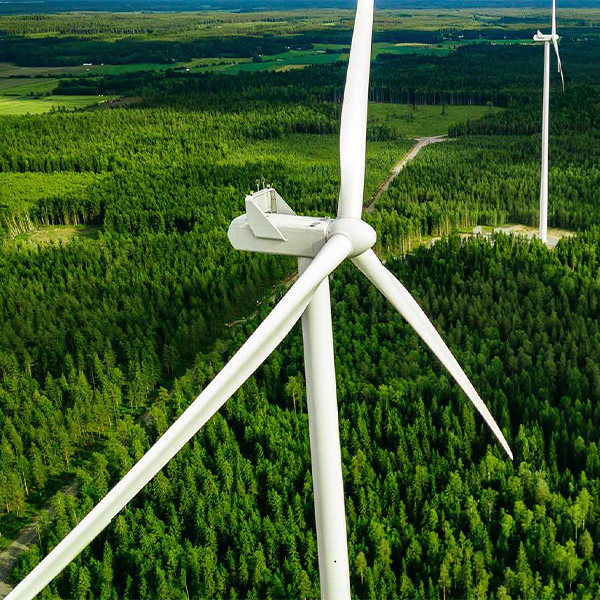
Sustainable operations
Zurich aims for net-zero operational emissions by 2030, accelerating the Group’s previous 2050 target.
Our approach to operational sustainability
Our priority is to reduce the amount of carbon dioxide equivalent (CO2e) emissions in the atmosphere, as we move towards our target to reduce absolute emissions of our own operations1 by 60 percent in 2025, by 70 percent in 20292 and finally to net-zero in 2030.
For our supply chain, our goal is for 75 percent of our managed procurement spend3 to be with suppliers that have science-based4 emissions reduction targets by 2025 and net zero5 targets by 2030.
A carbon dioxide-equivalent is used to measure and compare emissions from greenhouse gases based on how much they contribute to global warming. Metrics for CO2e show how much a particular gas would contribute to global warming if it were carbon dioxide.
We have already made significant progress in this respect and have a clear path to further reduction. Measures include increasing our usage of renewable electricity and electric vehicles, while also embracing hybrid working and travelling in a smarter way, for example, by combining trips, taking less trips, or using technology instead of in-person meetings requiring travel.
Even with deep and widespread cuts, we know that it will be impossible to reduce all emissions to zero in this timeframe. That’s why we will balance out our unavoidable residual emissions by funding projects that will remove carbon from the atmosphere for the long term. We will provide our funding by purchasing carbon removal certificates.
Our governance principles
We strive to lead by example, and this drives our approach to operational sustainability at Zurich Insurance Group (Zurich). To help accelerate reductions in emissions, enhance resilience to climate change and regenerate nature, we integrate sustainability considerations into our operational business processes.
Good governance principles to guide our own behavior help reinforce our ambition to be recognized as one of the most responsible and impactful businesses in the world.
An essential part of our approach is our spirit of collaboration. Internally, with our suppliers and other external engagements, we strive to bring together ideas and people to learn from one another, and develop new initiatives and programs to enhance our sustainability efforts.
Since 2014, Zurich has implemented internal guidelines based on external guidance as provided by the ISO14001 Environmental Management System. These guidelines align with the expectations expressed by our shareholders, investors, customers, employees and corporate peers, who expect Zurich to demonstrate best practice in operational sustainability performance. Our approach to the management of sustainability risks and opportunities in Zurich’s operations is further explained in Zurich's approach to operational sustainability file.
Key sustainable operations programs
Own operations and supply chain
Absolute carbon emissions coming from our own operations1
| Absolute carbon emissions in metric tons of CO2e | 2024 final | 2024 Progress against baseline in % | 202313 | 2023 Progress against baseline in % | 2019 (baseline) | Target reduction | ||
|---|---|---|---|---|---|---|---|---|
| by 2025 | by 2029 | by 2030 | ||||||
| Absolute carbon emissions | 56,406 | (69) | 60,066 | (67) | 180,805 | (60) | (70) | Net-zero |
| Scope 1 + 2 emissions | 18,003 | (63) | 19,807 | (59) | 48,290 | (62) | (80) | Net-zero |
| Fleet emissions | 14,470 | 15,524 | 20,285 | |||||
| Onsite heating | 1,942 | 2,341 | 379 | |||||
| Electricity emissions | 26 | 62 | 20,630 | |||||
| District heating emissions | 1,565 | 1,880 | 3,581 | |||||
| Scope 3 emissions | 38,403 | (71) | 40,259 | (70) | 132,515 | (60) | (67) | Net-zero |
| Printed paper | 2,117 | 1,384 | 2,435 | |||||
| Strategic data center | 0 | 6,847 | ||||||
| Energy and fuel related emissions | 4,315 | 4,697 | 11,731 | |||||
| Waste | 150 | 192 | 808 | |||||
| Business travel emissions | 15,174 | 14,861 | 41,018 | |||||
| Air travel emissions14 | 14,091 | 13,559 | 39,435 | |||||
| Rental car emissions | 618 | 841 | 1,241 | |||||
| Rail emissions | 465 | 422 | 342 | |||||
| Employee commuting | 16,647 | 19,125 | 69,676 | |||||
In 2024, we achieved a reduction in total operational emissions over the previous year following two years of rebound since the COVID-19 pandemic-induced decline. Against our 2019 baseline, the reduction was 69 percent. The strongest reduction was in our employee commuting emissions which was primarily due to data quality improvements. We are continuously improving the calculation approach, reducing dependencies on assumptions, and expanding automation. For example, we are able to capture actual commutes taken and link them to the commuting profile of the individual (if that commuter chose to provide the details of their commute). We also continued to progress on our transition to electric vehicles15, adding more than 900 electric vehicles during 2024, totaling 49 percent of the global car fleet. If we also count hybrids, this covers 61 percent of the car fleet. Air travel emissions increased by 4 percent compared to 2023, as we continue to prioritize the needs of our customers and partners.
While print has increased slightly since 2023, emissions have disproportionately increased due to a change in the calculation methodology for the underlying DEFRA emissions factors.
In 2024, we expanded our emissions measurement for entities which were not included in the baseline in 2019. Estimations have been prepared for those.16 Scope 3 emissions, in particular employee commuting and business travel, represent the highest emissions sources in our estimates.

Reporting methodology – key facts
- Zurich’s environmental reporting methodology follows the GRI Standard, which is based on the requirements of the Greenhouse Gas Protocol Corporate Accounting Standards. In line with the guidance provided by these standards, we comply with mandatory scope 1 and scope 2 emissions reporting and include scope 3 emissions where we have determined the sources to be material, where we have the ability to report meaningful data, and where we have the ability to influence emissions reductions.
- All data is reported in line with the calendar year January 1 through December 31.
- For facilities (electricity and heating) and commuting data, extrapolations are used where no actual data is available, to ensure 100 percent coverage. Extrapolations are based on regional, global or country average intensity factors for electricity, heating, or commuting behavior (respectively).
- For larger offices (greater than 250 headcounts), where waste data is not reported, an extrapolation is applied based on global average intensity factors.
- Applied emission factors were obtained primarily from the most recent versions of the GHG Protocol, DEFRA and IEA. Where specific emission factors were available (e.g., national rail factors), these were utilized consistently by data type and source.
- Carbon offsets are not used to meet emissions reduction targets.
Verification of data
We are working to increase data transparency, quality and coverage of our environmental performance reporting. Zurich engages an external auditor to verify our operational environmental data published on this website. Data from 2021 onwards was verified at reasonable assurance level. The latest results and assurance statement on 2024 data is available here:
Download full 2024 results
Assurance statement 2024
1 Cover-More, Farmers Group, Inc. and its subsidiaries, our joint ventures with Banco Sabadell and Banco Santander, smaller businesses like Real Garant and Orion, third party vendors as well as our new acquisitions Zurich Kotak and Travel Guard are out of scope.
2 The 2025 and 2029 targets for our own operations are against a 2019 baseline.
3 Managed procurement spend means the spend of approximately USD 2 billion annually managed by Zurich's Procurement and Vendor Management function on goods and services that are required to enable Zurich to maintain and develop its operations.
4 We consider a supplier to have science-based targets when their emission reduction targets are approved by a scientifically accredited body or otherwise require a reduction of at least 42 percent in scope 1 and 2 emissions by 2030.
5 We consider a supplier to have net-zero targets when their net-zero target is approved by a scientifically accredited body or otherwise has a public target to neutralize any residual scope 1 and 2 emissions by 2050.
6 Our 2022 target signifies Zurich’s commitment to achieving 100 percent renewable power globally. We have procured renewable electricity to match the demand of our global offices, with the exception of Bermuda, where we are seeking the best solution. Due to its small load (0.15% of our global load) we rounded up the missing percentage to 100% for clarity in reporting. In addition, Zurich is a member of RE100, a global leadership initiative bringing together influential businesses committed to 100 percent renewable electricity to demonstrate our leadership and commitment to renewable energy. Where our offices cannot meet the RE100 market boundary criteria, we have sourced certificates from adjacent markets in Qatar, Bahrain and Ecuador. Our progress towards the RE100 technical criteria will be confirmed after the 2025 RE100 disclosure cycle. Power consumption in data centers is reported under scope 3 and is not included in the RE100 commitment. However, we have strived to closely align with RE100 technical criteria, with the exception of our Singapore data center, for which we have purchased Malaysian I-RECs.
7 RE100 is a global leadership initiative bringing together influential businesses committed to 100 percent renewable electricity.
8 EV100 is a global leadership initiative bringing together influential businesses committed to accelerating the transition to electric vehicles which includes battery electric vehicles, hydrogen fuel cell vehicles, and plug-in hybrid vehicles.
9 Full-scale restaurants include where Zurich is the contracting party to the catering provider, a complete kitchen is onsite, and hot meals are prepared and served. This includes seven restaurants in five countries which service approximately 25 percent of our employees.
10 By 2029, non-plug-in hybrids will also be eliminated, in line with our EV100 commitment.
11 Subject to regulatory requirements; customers may continue to opt in to paper-based communications, according to their preferences.
12 Cover-More, Farmers Group, Inc. and its subsidiaries, our joint ventures with Banco Sabadell and Banco Santander, smaller businesses like Real Garant and Orion, third party vendors as well as our new acquisitions Zurich Kotak and Travel Guard are out of scope of this commitment.
13 2023 environmental performance results
14 We are using 2022 DEFRA emissions factors for air travel given subsequent updates incorporated load factors which were impacted by the pandemic. This would have inflated air emissions by an estimated 20 percent and would not reflect an accurate view of our travel activity.
15 Including battery electric vehicle and plug-in hybrid
16 Those include Cover-More, our joint ventures with Banco Sabadell and Banco Santander, smaller businesses like Real Garant and Orion, and our new acquisition Zurich Kotak. The acquisition of Travel Guard is not included due to the late closing in December 2024


